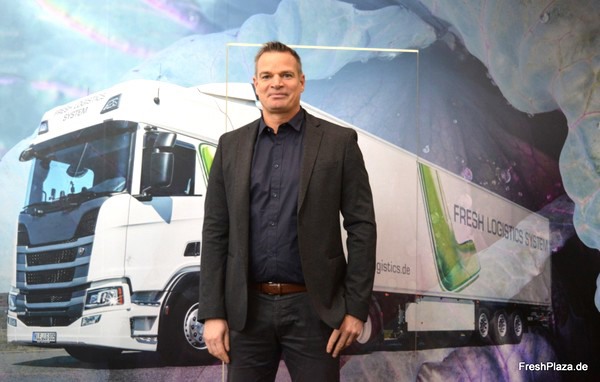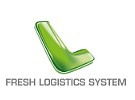Due to increased freight rates and driver shortages, the logistics sector is still under considerable pressure. This is also making itself felt at Fresh Logistics System Ltd (FLS for short), a wholly-owned subsidiary of the Landgard Group with a total of six locations (Straelen-Herongen, Neu Wulmstorf, Wiesmoor, Geldern-Lüllingen, Halle and Achern) in Germany.
"The pressure on costs and margins has increased massively, with energy prices, in particular, recording enormous price jumps last year. We can only partially pass on this increased cost burden to our customers," says FLS Managing Director Stefan Streuer.
Meanwhile, the driver shortage is also having a huge impact on supply chains, he adds. "On the one hand, customers in many areas were not willing to bear the additional costs incurred. On the other hand, it is becoming increasingly difficult to move goods from A to B on time due to the lack of drivers. These two crucial issues mean that we are facing a serious shortage of freight space. It's more important than ever to consolidate the flow of goods to increase efficiency."
According to Streuer, the entire supply chain - starting from the field to the POS with all participants, from the producer to the retail customer - must be coordinated much more closely. After all, only professionally organizing one's own area of responsibility will not make the gears of the entire supply chain mesh. For example, delivery times could be fundamentally changed in close consultation with customers in order to significantly increase capacity utilization and the number of tours. These are all measures that help to adequately counter cost pressure and also achieve more sustainable transport. However, this will only succeed if the interaction between customer and supplier functions smoothly. There is a discernible trend toward greater willingness on the part of the customer, who is increasingly aware that the volatility of the supply chain also presents him with major challenges. It is nevertheless difficult to actually implement the entire requirements in practice."
 FLS boss Stefan Streuer at the Landgard stand at this year's Fruit Logistica
FLS boss Stefan Streuer at the Landgard stand at this year's Fruit Logistica
Complete logistics service from a single source
For 16 years now, Fresh Logistics System has given priority to the transport and fresh produce logistics needs of parent company Landgard. About 70 percent of the company's activities are related to the range of flowers and plants, and the rest to logistics and services for fruit and vegetables. Streuer: "In addition, we are also active in the third-party market by trying to achieve bundling effects in the freight area. We are helped in this by our national network with locations in all directions: In the north, south of Hamburg, we have a hub for fruit and vegetables, such as overseas goods, while the Achern site, for example, has established itself as a hub for the flow of goods from France and Spain. In addition, we also cooperate closely with numerous forwarders and partners in Germany and abroad to bundle freight and optimize processes."
Up to now, the main focus has been on the transport of perishable goods. From this base, the range of services offered by FLS has developed rapidly, Streuer says. "We want to offer our customers the full range of logistics services. That means we not only transport goods, but we are responsible for the entire value chain, such as intralogistics services like sorting and packaging, quality control, picking/packaging, and empties and returns management. This is the trend we are currently observing: People nowadays no longer want to turn to several companies, but if possible, to one logistics partner who can offer the complete portfolio from a single source, i.e., from the field to the store."

Strategic course setting and cooperation
In the wake of the aforementioned challenges, Streuer also observes a growing need for intensive cooperation among colleagues abroad. "We all have to deal with similar challenges. In the coming years, it will become more important to cooperate in a spirit of partnership and also to pass balls to each other in order to survive in a tense market environment," Streuer emphasizes.
New drive concepts to reduce CO2 emissions will also be crucial, he adds. "The range problem still has an inhibiting effect on electric trucks, for example. Nevertheless, we are already examining possibilities in local transport in close exchange with the manufacturers. Now we need to create the conditions - especially in the charging infrastructure - so that we can fully implement these variants in the future."
In order to secure the future of sustainable fresh produce logistics, however, Streuer believes that further strategic decisions are also necessary. "We are also working on the topic of digitalization, such as telematics integration, guided navigation, and driver apps. The same applies to solar panels and e-motors for our refrigeration units to reduce diesel consumption and pollutant emissions."
"Another major task is to counteract the shortage of drivers and significantly improve the status of the profession. Many Eastern Europeans now find better conditions in their own country than in Germany. We need to create framework conditions so that the appreciation of drivers increases and the job profile of truck driver becomes significantly more attractive than it has been so far and a larger number of qualified junior staff develops."
For more information:
Stefan Streuer
Fresh Logistics System GmbH
Veilingstraße A1
47638 Straelen-Herongen
Tel.: +49 2839 59-4153
Fax: +49 2839 59-4159
Mail: [email protected]
www.freshlogistics.de










